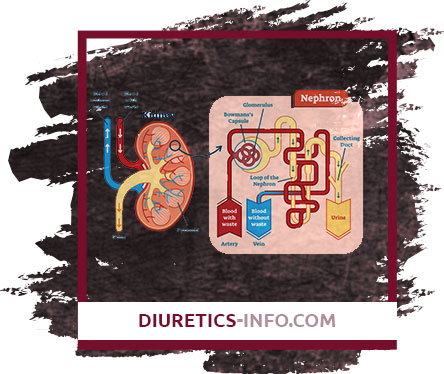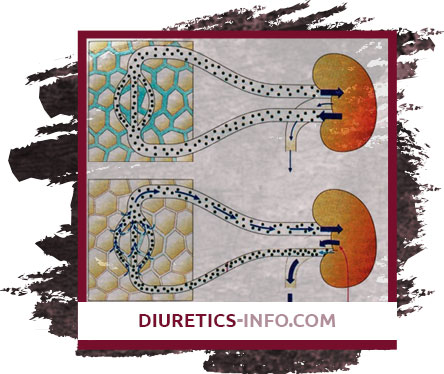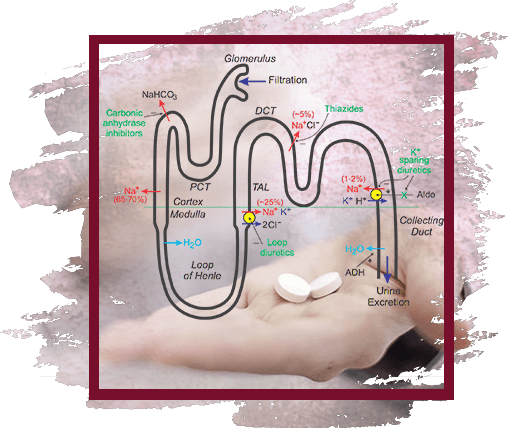
Diuretics: mechanism of action, classification, list of drugs and side effects
Diuretics are medications used to treat many conditions that cause excess fluid to accumulate in the body. These include a wide range of drugs that help reduce swelling and normalize the amount of fluid in cells and tissues. In addition to the medical field, diuretics are widely used in sports and nutrition.

The mechanism of action of diuretics
Diuretics are drugs that slow down the absorption of salts and fluids in the kidney tubules, thereby increasing the volume of fluid excreted by the urinary system. What are diuretics - in simple words, they are diuretics that accelerate the flow of urine. What is a diuretic in medicine? It is a medication, the effect of which is based on the ability to inhibit the reabsorption of electrolytes by the kidneys. Enhanced elimination of electrolytes is accompanied by an increase in the volume of fluid excreted from the body.
Indications for the use of diuretics
Due to the specific mechanism of action, diuretics are used in the treatment of diseases associated with excessive edema. In pharmacology, diuretics are prescribed in the following cases:
- heart and vascular failure
- glaucoma, accompanied by increased eye pressure
- arterial hypertension
- liver disease
- thiazide diuretics are prescribed for osteoporosis
- renal pathologies, accompanied by edema
- acceleration of the elimination of toxic substances in various poisonings
Increased puffiness is often a consequence of pathologies of the cardiovascular and urinary systems. The accumulation of excess fluid develops against the background of sodium retention in the body. Diuretics for hypertension and heart failure are aimed specifically at removing excess sodium, which leads to contraction, narrowing and increased vascular muscle tone. Diuretic drugs remove excess sodium, as a result of which the vessels dilate, the level of blood pressure decreases. In such cases, thiazide-like diuretics are prescribed.
Due to their mechanism of action, thiazide diuretics are used in cases of acute poisoning for forced diuresis. This is an emergency procedure, during which a large volume of solution is injected intravenously to patients, followed by a diuretic, which accelerates the elimination of toxic substances from the body.
Diuretic classification
Diuretics are of synthetic or herbal origin. All groups of diuretics have a different chemical structure, on the basis of which their classification is based.
Classification of diuretics by mechanism of action:
- osmotic
- potassium-containing
- thiazide
- looped
Each of these groups has a specific type of action on the body. It is on the basis of the characteristics of the pharmacological action that the doctor selects a diuretic for a disease associated with increased swelling.
Osmotic diuretics
Osmotic diuretics are potent diuretics in the diuretic classification, which are most often used as part of the complex treatment of the most severe, acute cases. Such funds are not prescribed by courses, but one-time. Their principle of action is based on a decrease in pressure in the blood plasma, which results in accelerated excretion of fluid from cells and tissues, and elimination of puffiness. These drugs are used for edema of the brain or lungs, acute poisoning, shock conditions.
Sulfanilamide diuretics
Sulfanilamide drugs are a large group of drugs, which include loop and thiazide diuretics. Thiazides are prescribed for hypertension. The minimum dosage of these drugs is used to prevent stroke. It is not recommended to increase the prophylactic dose, as this can lead to hypokalemia. If necessary, thiazides are used concurrently with potassium-sparing diuretics. Loop diuretics provide an immediate diuretic effect by acting on kidney filtration and accelerating the elimination of fluids and salts from the body. Medicines of this group act in the area of the ascending part of the Gently loop. They are distinguished by a quick diuretic effect, due to which they are used for the purpose of emergency relief of symptoms of renal and cardiovascular failure.
Potassium-sparing diuretics
Potassium-sparing diuretics are diuretics with a mild, gentle effect. They activate the excretion of sodium and chloride ions, while simultaneously reducing the yield of potassium. Medicines act directly on the distal tubules, which are "responsible" for the exchange of sodium and potassium ions. Diuretics of this group are prescribed for congenital Liddle's syndrome, cirrhosis, glaucoma. They have no negative effect on glomerular filtration.
Slimming diuretics
Recently, diuretics for weight loss have become widespread. The popularity of this method of weight loss is due to the fact that adipose tissue is 90% built from water. The accelerated elimination of fluid helps to reduce the amount of body fat. A rational combination of diuretics really has an antiatherogenic effect, due to which cholesterol plaques are destroyed. But the opinion that you can get rid of extra pounds with the help of diuretics is nothing more than a myth.
In the process of taking diuretics, only liquid is excreted from the body. They have no effect on fat cells. After the end of the medication intake, all the lost kilograms are returned.
Uncontrolled intake of diuretics leads to a violation of the water-salt balance in the body, dehydration, and other serious pathologies. In the most severe cases of diuretic overdose, renal dysfunction, visual and auditory hallucinations, and coma are possible. Medicines that are classified as diuretics are also used in the field of sports. Some athletes believe that the elimination of excess fluid from the body contributes to the so-called "muscle definition". The diuretic helps to hide the traces of the use of various doping drugs.
Diuretics that increase the volume of urine excreted significantly reduce the concentration of doping drugs and their decay products in the bloodstream. Some athletes use diuretic drugs to quickly lose body weight in order to participate in various sparring and competitions in a smaller weight category.
After the death of one of the athletes taking diuretics for emergency weight loss, diuretic drugs in sports are prohibited.
Diuretics in bodybuilding
Diuretic drugs are widely used by athletes involved in bodybuilding. The most commonly used diuretics are loop diuretics, which have an immediate effect. To use such medications should be extremely careful, since in conditions of increased physical exertion, they provoke severe dehydration.
In bodybuilding, diuretics are used before competition to reduce the amount of fluid in the subcutaneous tissue - this helps to make the weightlifter's body more prominent. There is also a special sports nutrition, which already contains substances with a diuretic effect. It should not be consumed for a long time.
List of diuretic drugs
- Furosemide
- Britomar
- Diuver
- Bufenox
- Lasix

Side effects of diuretics
Diuretic medications should be taken with extreme caution, as uncontrolled use can cause serious harm to health.
Side effects of diuretics:
- Increased concentration of uric acid in the blood
- Dry mouth
- Drowsiness, lethargy, apathy
- Muscle spasms
- Stool disorder
- Increased blood sugar
- Deterioration of libido
- Headaches, dizziness
The consequence of the use of Furosemide is often nausea, diarrhea, a decrease in calcium, potassium and magnesium. Also, possible side effects of diuretics include vomiting, skin rashes, in men - deterioration of erectile function, in women, menstrual irregularities are observed.
Herbal diuretics
Over-the-counter diuretics are serious medications that, if taken uncontrollably, have dangerous health consequences. Therefore, to obtain a diuretic effect, many people prefer to use herbal diuretics - medicinal plants, food.
Herbal diuretics
- birch leaves
- chicory
- shepherd's bag
- rosehip
- tansy
- horsetail
- chamomile
- bearberry
- juniper
- flaxseeds
Natural diuretics are used in the form of infusions or decoctions. But before using them, you must definitely consult a doctor, since any medicinal plant has a number of contraindications.
Diuretic products
- strawberries
- lingonberry
- watermelon
- melon
- cucumbers
- pumpkin
- celery
- parsley and dill
- cranberry
- a pineapple
Natural diuretics have several advantages over drugs - they have a mild and sparing effect on the body, are suitable for long-term use, and do not cause severe adverse reactions. Such mild diuretics are allowed to be combined with medications.
Contraindications to the use of diuretics
Diuretics in pharmacology are classified into separate groups, but a number of absolute contraindications stand out, in which the use of any diuretics is strictly prohibited. Contraindications for diuretics:
- hypokalemia
- decompensated cirrhosis of the liver
- renal and respiratory failure in acute form
Thiazides are not used in any type of diabetes mellitus, as they can cause a sharp increase in blood sugar levels. Osmotic diuretics are prohibited in cases of insufficient cardiac activity.
Output
Diuretics are diuretic drugs that are used to treat conditions with increased swelling. These are powerful remedies that are recommended to be taken only as directed by your doctor. Uncontrolled intake of diuretic medicines can lead to dangerous consequences for the body.
 DE
DE FR
FR IT
IT ES
ES






